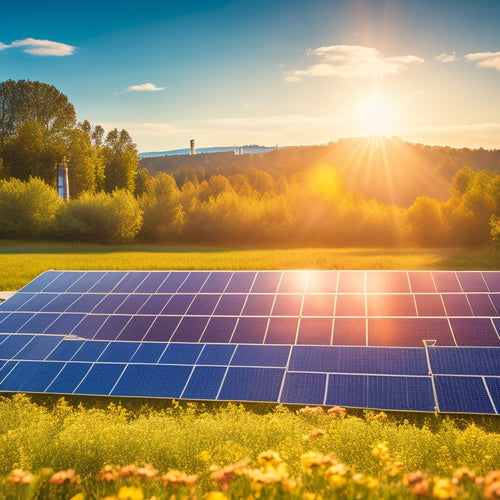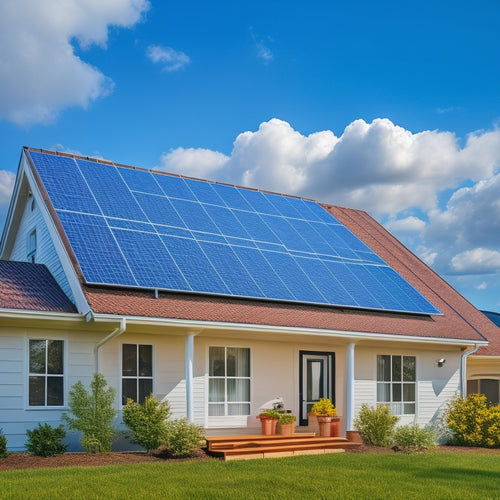
3 Essential Tips for RV Solar Battery Charging
Share
When it comes to RV solar battery charging, you need to get it right. First, select solar panels that match your wattage needs, balancing cost, efficiency, and installation ease. Next, optimize your charging times by understanding the three stages of a typical charge cycle, ensuring your batteries are fully charged and maintained at peak levels. Finally, monitor your system's performance by tracking key metrics and setting alert thresholds to identify improvements and predict potential failures. By following these essential tips, you'll be well on your way to a reliable and sustainable energy supply - and there's more to explore to take your system to the next level.
Key Takeaways
• Choose the right solar panels for your RV by considering the wattage needed for charging batteries and balancing cost, efficiency, and installation ease.
• Optimize battery charging times by understanding the three stages of a typical charge cycle: bulk, absorption, and float, to prolong battery life and increase efficiency.
• Regularly monitor system performance by tracking key metrics like voltage, current, and temperature to identify improvements and predict potential failures.
• Ensure batteries are fully charged and maintained at optimal levels to maximize energy output and overall power system efficiency.
• Consider a portable solar panel system for flexibility and convenience, especially if you frequently change campsites or have limited roof space.
Choosing the Right Solar Panels
When selecting solar panels for your RV, think about the wattage you need, as it directly impacts the number of batteries you can charge and the speed of charging. A higher wattage panel can charge your batteries faster, but it also increases the overall cost. You'll need to strike a balance between the two.
Panel efficiency is another vital factor to think about. Look for panels with high efficiency ratings, as they can generate more power per hour of sunlight. This is especially important for RV owners who often find themselves in shaded or cloudy areas. A more efficient panel can still produce some power even in less-than-ideal conditions.
Mounting options are also crucial to think about. You'll need to decide whether to use a roof-mounted or portable system. Roof-mounted systems are more permanent and often more cost-effective, but they can be more difficult to install.
Portable systems, on the other hand, offer more flexibility but may require more maintenance. By thinking about these factors, you can choose the right solar panels for your RV's unique needs.
Optimizing Battery Charging Times
With your solar panels in place, you'll want to maximize their energy output by optimizing battery charging times, a critical step in guaranteeing your RV's power system is always ready to go. Optimizing charging times not only prolongs the life of your batteries but also increases the overall efficiency of your RV's power system.
To optimize charging times, it's crucial to understand the charging cycle of your batteries. A typical charge cycle consists of three stages: bulk charging, absorption charging, and float charging. Bulk charging is the fastest stage, where the batteries are charged at their maximum rate. Absorption charging is a slower stage, where the batteries are charged at a lower rate to ensure they're fully charged. Float charging is the final stage, where the batteries are maintained at a trickle charge to keep them topped up.
Here's a breakdown of the charging cycle:
| Stage | Charge Rate | Time |
|---|---|---|
| Bulk | 80% of capacity | 1-2 hours |
| Absorption | 20% of capacity | 2-4 hours |
| Float | Trickle charge | Ongoing |
Monitoring System Performance
You need to keep a close eye on your RV's solar battery charging system to make sure it's running efficiently, and that means regularly monitoring its performance. This involves tracking key metrics such as voltage, current, and temperature to identify any potential issues before they become major problems.
By setting alert thresholds, you can receive notifications when parameters stray outside acceptable ranges, allowing you to take corrective action quickly. Data analytics plays a vital role in this process, as it enables you to analyze trends and patterns in your system's performance over time.
This can help you optimize your charging routine, identify areas for improvement, and even predict potential failures before they occur. By staying on top of your system's performance, you can guarantee maximum efficiency, prolong the lifespan of your batteries, and enjoy a more reliable and sustainable energy supply on the road.
Frequently Asked Questions
Can I Use a Generator to Charge My RV Batteries?
You can use a generator to charge your RV batteries, but be mindful of Generator Maintenance and prioritize Fuel Efficiency to minimize costs and environmental impact, ensuring a reliable and sustainable power source on-the-go.
Do I Need to Clean My Solar Panels Regularly?
"As you bask in the radiant glow of your solar panels, remember that dust accumulation is the silent saboteur of panel efficiency - you'll need to clean them regularly to prevent energy-sapping grime from building up!"
Can I Mix Old and New Batteries in My RV System?
When mixing old and new batteries, you risk Cell Mismatch, reducing overall performance and lifespan. Different Battery Age and wear patterns can cause voltage and capacity disparities, so it's generally not recommended to combine old and new batteries in your RV system.
How Often Should I Check My Battery Water Levels?
You should check your battery water levels every 1-2 weeks, as part of regular battery maintenance, to guarantee peak performance and prevent damage from over- or under-watering, which can shorten their lifespan.
Are Lithium-Ion Batteries Worth the Extra Cost for RV Use?
" Buckle up, time-traveler! When considering lithium-ion batteries for your RV, you're investing in longer battery longevity, but is the extra cost worth it? Compare the cost of traditional batteries to lithium-ion's 5-7 year lifespan, and the answer becomes clear."
Related Posts
-

Advantages of Solar Generating Systems Over Traditional Energy
Solar generating systems provide several key advantages over traditional energy sources. You'll experience lower long...
-

Why Outdoor Solar Lighting Systems Are Sustainable
Outdoor solar lighting systems are sustainable because they utilize renewable energy, drastically reducing your carbo...
-

Cost of Solar Panel Installation
You can expect to pay between $15,000 and $30,000 or more for a typical solar panel installation, depending on the sy...


